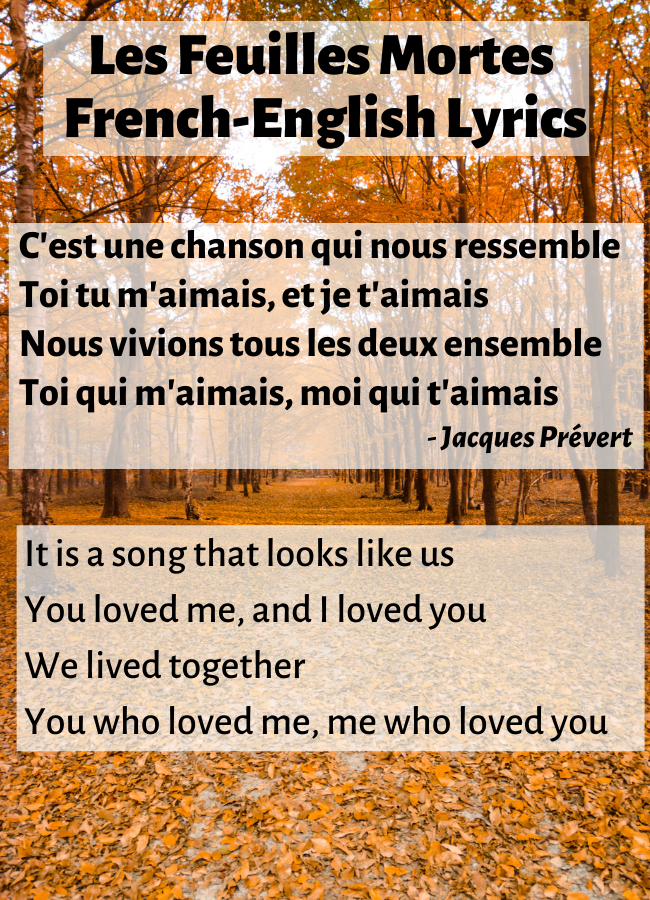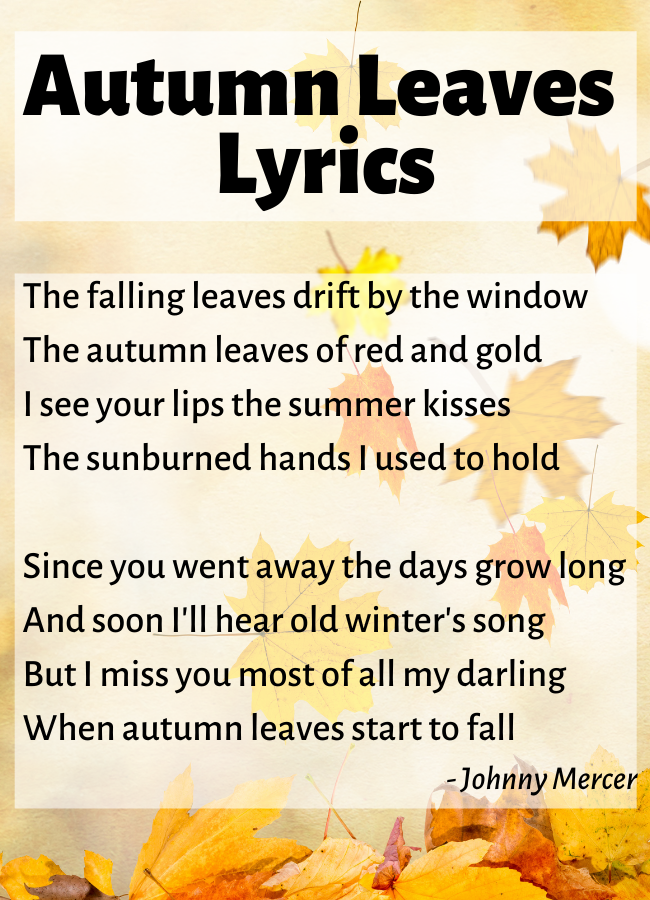In this post we’ll take a close look at the classic French song Les Feuilles Mortes (1945) by Yves Montand. This is the original French vergion of the popular jazz song Autumn Leaves. This post offers line-by-line explanations of the French lyrics’ vocabulary and grammar as well as an original English translation of the French lyrics.

Les Feuilles Mortes song overview
Les Feuilles Mortes is a French song written by Joseph Kosma in 1945 with lyrics by Jacques Prévert. The literal meaning of “Les Feuilles Mortes” is “The Dead Leaves”. In 1947, American lyricist and songwriter Johnny Mercer wrote English version of the song, “Autumn Leaves”. The song was first sung in the 1946 film Les Portes de la nuit by Yves Montand and Irène Joachim. Montand later recorded the most famous version of the song in French in 1950.
Legendary French female singer, Edith Piaf (1915-1963) also made an English recording of Autumn Leaves in 1950.
Les Feuilles Mortes is considered a jazz standard. Notable recordings of the song’s English version, Autumn Leaves, have been made in the 1950s by Bing Crosby (1950), Nat King Cole (1955), Stan Getz (1955), Frank Sinatra (1957), Eric Clapton (2010), Ed Sheeran (2011), Eva Cassidy (1996) and Paula Cole (1997).
Listen to Les Feuilles Mortes sung by Yves Montand
The following YouTube video is of Montand singing the French version of Les Feuilles Mortes.
Listen to the song on Spotify:
Les Feuilles Mortes lyrics analysis
Lyrics translated by David Issokson
The French version of Autumn Leaves, Les Feuilles Mortes, is a sorrowful love song with the singer pining for a lover from whom he has been separated for many years.
He makes reference to the days when they were living happily together. Then, he goes on to compare the ended and past romance to dead leaves that were blown away by the north wind and the sea erasing their two sets of footprints on the sand.
Oh, je voudais tant que tu te souviennes
This line translates to “I want so much that you remember“. Se souvenir is a reflexive verb that means “to remember”. This line is written in the subjunctive mood, which is used for expressing wishes, emotions and doubts.
Des jours heureux où nous étions amis
This line translates to “happy days when we were friends“. “Nous étions” is the verb être (to be) conjugated in the imperfect tense. The imperfect is the French “used to” tense, which is used for describing past actions which occurred at undefined periods of time.
Et le soleil plus brûlant qu’aujourd’hui
We translated this line to “And the sun more burning than today“. The translation of the French verb brûler is to burn and to blaze. We could have translated brûlant to “blazing” or even “shining”.
Les feuilles mortes se ramassent à la pelle
This was the most difficult line to translate in the entire song. The verb ramasser means to pick or gather up. The reflexive infinitive “se ramasser” suggests a passive voice: “Are picked up”. The phrase “À la pelle“ translates literally to “by shovel” or “by spade”. Hence, the translation of the line is: “The dead leaves picked up by shovel“.
Et le vent du Nord les emporte
This line translates to “And the north wind blows them away“. In the context of wind, the verb emporter means to blow away. In this sentence, the word “les” is a direct object pronoun, meaning “them” and referring back to the dead leaves.
Tu vois, je n’ai pas oublié
This line translates to “You see, I did not forget”. J’ai oublié is the compound past (passé composé) of the verb oublier, which means to forget.
La chanson que tu me chantais
This line translates to “The song you used to sing to me“. The verb chanter (to sing) is in the imperfect, or “used to” tense. The word “que” means “that” and is a relative pronoun.
C’est une chanson qui nous ressemble
This line was difficult to translate. Our translation was “It is a song that looks like us“. The verb ressembler means to resemble or look like. The word “qui” here doesn’t mean who. In this line qui is another relative pronoun, meaning “that”.
This line would have made more sense had the verb been “rassembler“, which means to unite or bring together. “C’est une chanson qui nous rassemble” translates to “It’s a song that brings us together”.
Toi tu m’aimais, et je t’aimais
This line translates to “You loved me, and I loved you“. The word “toi” is a stressed pronoun for “you“. The m’ means “to me” and the t’ means “to you”.
Nous vivions tous les deux ensemble
We simply translated this line to “We lived together“. In this sentence, the verb vivre (to live) appears in the imperfect, or “used to” tense. “Tous les deux“ translates to both and “both of us”. Ensemble means together.
Toi qui m’aimais, moi qui t’aimais
This line translates to “You who loved me, me who loved you”. Again, toi and moi are stressed pronouns for “me” and “you”. The word “qui“ on this line means who. The verb aimer (to like, to love) appears in the imperfect or “used to” tense.
Mais la vie sépare ceux qui s’aiment
This line translates to “But life separates those who love each other“. The word “ceux” means those as “those people”. This is a demonstrative pronoun. “S’aiment” is a reciprocal reflexive verb, meaning “love each other”.
Tout doucement, sans faire de bruit
We translated this line to “Very softly, without making noise“. The word doucement has multiple translations including gently, softly, slowly, carefully and quietly.
Et la mer efface sur le sable
This line translates to “And the sea erases on the sand“. The French verb effacer means to erase, wipe away and wipe off.
Les pas des amants désunis
This line translates to “The steps of separated lovers“. The word “pas” in French usually appears in French negation, where ne…pas gets wrapped around the verb. However, in this line, “pas“ means step of footstep.

Les Feuilles Mortes lyrics and English translation
Oh, je voudais tant que tu te souviennes
Des jours heureux où nous étions amis
En ce temps-là la vie était plus belle
Et le soleil plus brûlant qu’aujourd’hui
Oh, I would you like so much for you to remember
The happy days when were were friends
During this time life was more beautiful
And the sun more burning than today
Les feuilles mortes se ramassent à la pelle
Tu vois, je n’ai pas oublié
Les feuilles mortes se ramassent à la pelle
Les souvenirs et les regrets aussi
The dead leaves picked up by shovel
You see, I did not forget
The dead leaves picked up by shovel
The memories as well as the regrets
Et le vent du Nord les emporte
Dans la nuit froide de l’oubli
Tu vois, je n’ai pas oublié
La chanson que tu me chantais
And the north wind blows them away
In the cold night of forgetting
You see, I didn’t forget
The song you used to sing to me
C’est une chanson qui nous ressemble
Toi tu m’aimais, et je t’aimais
Nous vivions tous les deux ensemble
Toi qui m’aimais, moi qui t’aimais
It is a song that looks like us
You loved me, and I loved you
We lived together
You who loved me, me who loved you
Mais la vie sépare ceux qui s’aiment
Tout doucement, sans faire de bruit
Et la mer efface sur le sable
Les pas des amants désunis
But life separates those who love each other
Very softly, without making noise
And the sea erases on the sand
The steps of separated lovers
La, la, la, la
La, la, la, la
La, la, la, la
La, la, la, la
La, la, la, la
La, la, la, la
La, la, la, la
La, la, la, la
Mais la vie sépare ceux qui s’aiment
Tout doucement, sans faire de bruit
Et la mer efface sur le sable
Les pas des amants désunis
But life separates those who love each other
Very softly, without making noise
And the sea erases on the sand
The steps of separated lovers
Listen to other recordings of Autumn Leaves
Edith Piaf (English version)
This video is of Edith Piaf singing her English version of Les Feuilles Mortes (Autumn Leaves).
Frank Sinatra (English version)
Eva Cassidy (English version)

Autumn Leaves English Version Lyrics
The following are the English lyrics of the song “Autumn Leaves”.
The falling leaves drift by the window
The autumn leaves of red and gold
I see your lips the summer kisses
The sunburned hands I used to hold
Since you went away the days grow long
And soon I’ll hear old winter’s song
But I miss you most of all my darling
When autumn leaves start to fall

